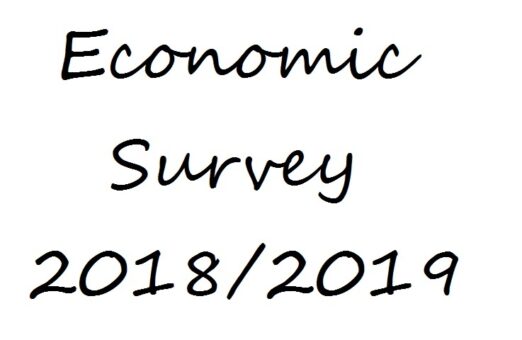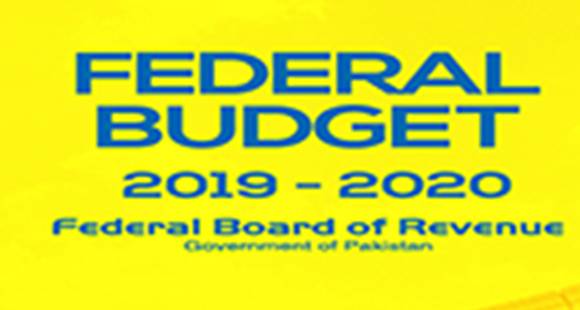ISLAMABAD: The outgoing fiscal year 2018-19 witnessed a muted growth of 3.29 percent against the ambitious target of 6.2 percent. The targets set for the various sectors missed or witnessed negative growth during fiscal year 2018/2019.
According to Economic Survey 2018/2019 launched by Dr. Abdul Hafeez Shaikh, Advisor to Prime Minister on Finance and Revenue on Monday.
It said that the target was based upon sectoral growth projections for agriculture, industry, and services at 3.8 percent, 7.6 percent and 6.5 percent respectively.
The actual sectoral growth turned out to be 0.85 percent for agriculture, 1.4 percent for industry and 4.7 percent for services.
Some of the major crops witnessed negative growth as production of cotton, rice and sugarcane declined by 17.5 percent, 3.3 percent and 19.4 percent respectively.
The crops showing positive growth include wheat and maize which grew at the rate of 0.5 percent and 6.9 percent respectively.
Other crops have shown growth of 1.95 percent mainly due to increase in production of pulses and oil seeds.
Cotton ginning declined by 12.74 percent due to a decline in production of cotton crop.
Livestock sector has shown a growth of 4.0 percent. The growth recorded for the forestry is 6.47 percent which was mainly due to increase in production of timber in Khyber Pakhtunkhwa ranging from 26.7 to 36.1 thousand cubic meters.
The growth in industrial sector has been estimated at 1.40 percent. The mining and quarrying sector has witnessed a negative growth of 1.96 percent mainly due to reduction in production of natural gas (-1.98 percent) and coal (-25.4 percent).
The large-scale manufacturing sector as per QIM data (from July 2017 to February 2018) shows a decline of 2.06 percent. Major decline has been observed in Textile (-0.27 percent), Food, Beverage & Tobacco (-1.55 percent), Coke & Petroleum Products (-5.50 percent), Pharmaceuticals (-8.67 percent), Chemicals (-3.92 percent), Non-Metallic Mineral Products (-3.87 percent), Automobiles (-6.11 percent) and Iron & Steel products (-10.26).
On the other hand, the substantial growth in LSM has been observed in Electronics (34.63 percent) Engineering Products (8.63 percent) and Wood Products (17.84 percent). Electricity and gas sub sector has grown by 40.54 percent, whereas the construction activity has declined by 7.57 percent.
The services sector has shown an overall growth of 4.71 percent. Wholesale and Retail Trade grew by 3.11 percent, while the Transport, Storage and Communication sector registered a growth of 3.34 percent mainly due to positive contribution by railways (38.93 percent), air transport (3.38 percent) and road transport (3.85 percent).
Finance and insurance sector showed an overall growth of 5.14 percent. While the central banking has declined by 12.5 percent, a positive growth has been observed in scheduled banks (5.3 percent), non-scheduled banks (24.6 percent) and insurance activities (12.8 percent).
The Housing Services has grown at 4.0 percent. The growth recorded in General Government Services is 7.99 percent which is mainly on account of increase in salaries of employees of federal, provincial and district governments.
Other private services, comprising of various distinct activities such as computer related activities, education, health & social work, NGOs etc recorded a growth of 7.05 percent.
The total investments as a percentage of GDP was recorded at 15.4 percent against the target of 17.2 percent. The fixed investment as percentage of GDP remained 13.8 percent against the target of 15.6 percent, while public and private investments remained at 4.0 and 9.8 percent against the target of 4.8 and 10.8 percent respectively.
The National Savings remained at 10.7 percent of GDP against the target of 13.1 percent.
The consumption growth was recorded at 11.9 percent compared to 10.2 percent growth recorded last year. As percentage of GDP, it increased to 94.8 percent compared to last year’s figure of 94.2 percent.
On the demand side, the exports declined by 1.9 percent despite exchange rate depreciation, while imports declined by 4.9 percent.
This helped in reducing the trade deficit by 7.3 percent during July- April FY 2019 while it had shown an expansion of 24.3 percent during the corresponding period of last year.
The workers’ remittances played a major role in containing current account deficit to 4.03 percent of GDP. The CAD showed a contraction of 27 percent during July-April of the current year while it had expanded by 70 percent during the corresponding period of last year.
The State Bank is following a contractionary policy to anchor the aggregate demand and address rising inflation on the back of high fiscal and current account deficits.
The next year, agriculture sector is likely to rebound under Prime Minister’s Agriculture Emergency Program.
The water availability is expected to be better as compared to current year. There is substantial increase in Agriculture Credit disbursement which is recorded at Rs. 805 billion during July-April FY2019 compared to Rs.666.2 billion during the corresponding period of last year, posting a growth of 20.8 percent.
The import of agriculture machinery has recorded a growth of 10.95 during July-April FY2019 which is a good indicator. The base effect will also support growth in agriculture.
The Large-Scale Manufacturing sector which posted a negative growth this year is likely to rebound on the back of expected growth in agriculture sector along with government initiatives in the construction sector, SMEs sector and tourism and automobile sector.
Both, agriculture and LSM sector growth is likely to have a good impact on services sector on account of goods transport services linked to agriculture and wholesale trade.
The fiscal tightening and the rising inflation on account of increasing utility prices, rationalization of taxes, measures to reduce the primary balance, and any further exchange rate adjustments, along with higher oil prices, protectionists tendencies in some of the economies and tightening monetary conditions in the developed countries leading to lower capital inflows will remain downside risk.
It said that the outgoing five-year plan has seen an average growth of 4.7 percent against the target of 5.4 percent.
This growth can be characterized as a consumption led growth. The unplanned borrowing from different sources increased both private and public consumption resulting in higher debt repayment liabilities, which created severe macroeconomic imbalances.
The investment did not pick up as higher demand was met primarily through imports leading to enormous rise in external imbalances.
Due to low growth in revenues and the unplanned and unproductive expenditures, the fiscal deficit widened. The persistence of large fiscal and current account deficits and associated build up of public and external debt became the major source of macroeconomic imbalance.
The new elected government faces formidable macroeconomic challenges. The foremost challenge to the economy is the rising aggregate demand without corresponding resources to support it, leading to rising fiscal and external account deficits.
To address the issue of severe macroeconomic instability and to put the economy on the path of sustained growth and stability, the government has introduced a comprehensive set of economic and structural reform measures.
As a short-term measure to get a breathing space, the government secured $ 9.2 billion from friendly countries to build up buffers and to ensure timely repayment of previous loans.
The government has also taken some overdue tough decisions i.e. increase in energy tariffs to stop further accumulation of circular debt, reduction in imports through regulatory duties and withdrawal of some of the tax relaxations given in the last budget in order to arrest the deterioration in primary balance.
These painful decisions were tough for the new elected government, but at the same time were necessary for economic stabilization. Recently, staff level agreement has been negotiated with the IMF to avail Extended Fund Facility for achieving macroeconomic stability.
The staff level agreement will now be placed before the IMF Board for its approval. The impact of macroeconomic adjustment policies, such as monetary tightening, exchange rate adjustment, expenditure control and enhancement of regulatory duties on non-essential imports, started to become visible this year.
These steps have served to bring some degree of stability and have also helped in reducing economic uncertainty. However, the situation calls for sustained efforts.
After witnessing a strong growth in 2017 at 4.0 percent, the global economic activity slowed during the second half of 2018 to 3.6 percent while it is expected to reduce further to 3.3 percent in 2019.
The slowdown in economic activity is attributed to multiple factors, including rising trade tensions and tariff hikes between the United States and China, which is the biggest risk to financial stability in Eurozone.
In contrast, some developing economies could be benefitting from this trade diversion as prices of these targeted goods may rise in US and China.
This tariff battle between USA and China is estimated to have affected almost 2.5 percent of global trade. Germany’s unemployment rate has shown an increase for the first time since 2013 amid signs of slowing growth in Europe’s biggest economy.
Uncertainty created by Brexit has led to decline in business confidence and has further contributed towards slowing of growth in Euro zone.
In response to the growing global risks to the economy, the US Federal Reserve has adopted a more accommodative monetary policy stance.
Similarly, other central banks around the world like the European Central Bank, the Bank of Japan and the Bank of England have also moved to adopt a more accommodative stance while China has ramped up its fiscal and monetary stimulus to cope with the negative effect of trade tariffs.
Resultantly, the tightening of financial conditions has reversed across countries. Likewise, emerging markets have witnessed resumption in portfolio flows, a decline in sovereign borrowing costs, and a strengthening of their currencies relative to the dollar.
As the growth is likely to improve during the second half of 2019, it is projected to return to 3.6 percent in 2020. The projected improvement in global economic growth during the second half of 2019 is expected on account of gradual recovery and stabilization in Argentina and Turkey along with some other stressed emerging economies, current build-up of policy stimulus in China and improvement in global financial sentiments The growth beyond 2020 is predicted to stabilize, mainly supported by growth in China and India.
However, the growth in advanced economies will continue to slow down on account of factors such as the fading of the impact of US fiscal stimulus, ageing trends and low productivity growth. On the other hand, the growth in emerging markets and developing economies is expected to stabilize at around 5 percent, though with substantial variation between countries.
According to World Economic Outlook (WEO) April (2019), the baseline outlook for emerging Asia remains favourable, with China’s growth projected to slow gradually toward sustainable levels and convergence in frontier economies toward higher income levels.
For other regions, the outlook is complicated by a combination of structural bottlenecks, slower advanced economy growth and, in some cases, high debt and tighter financial conditions.
These factors, alongside subdued commodity prices and civil conflict in some cases, contributed to subdued medium-term prospects for Latin America; the Middle East, North Africa, and Pakistan region; and parts of sub-Saharan Africa.




